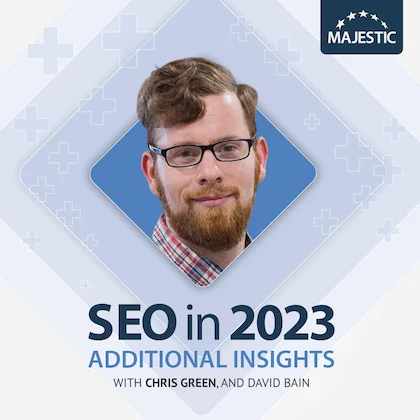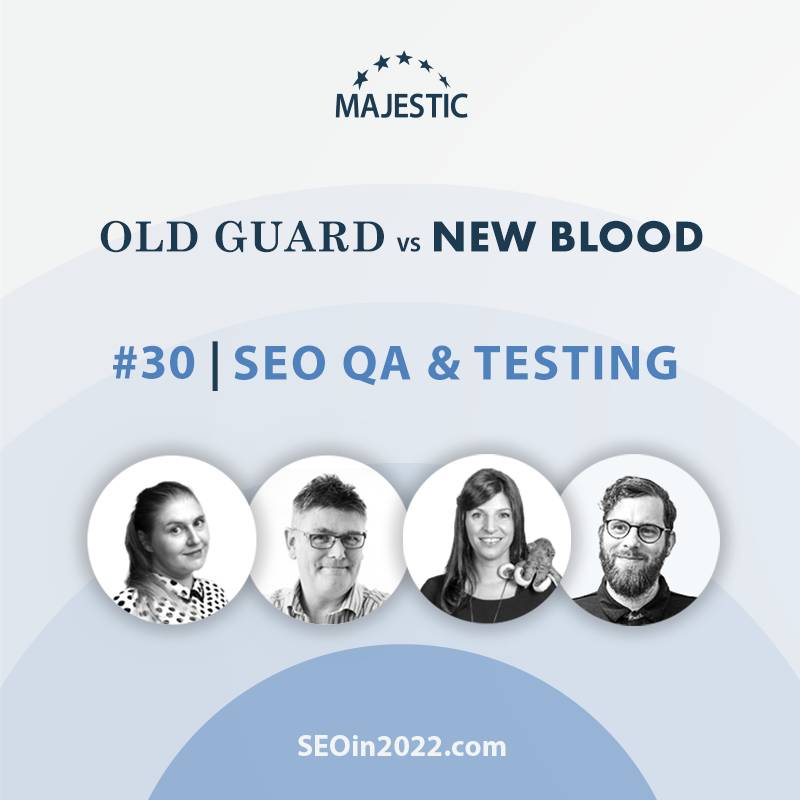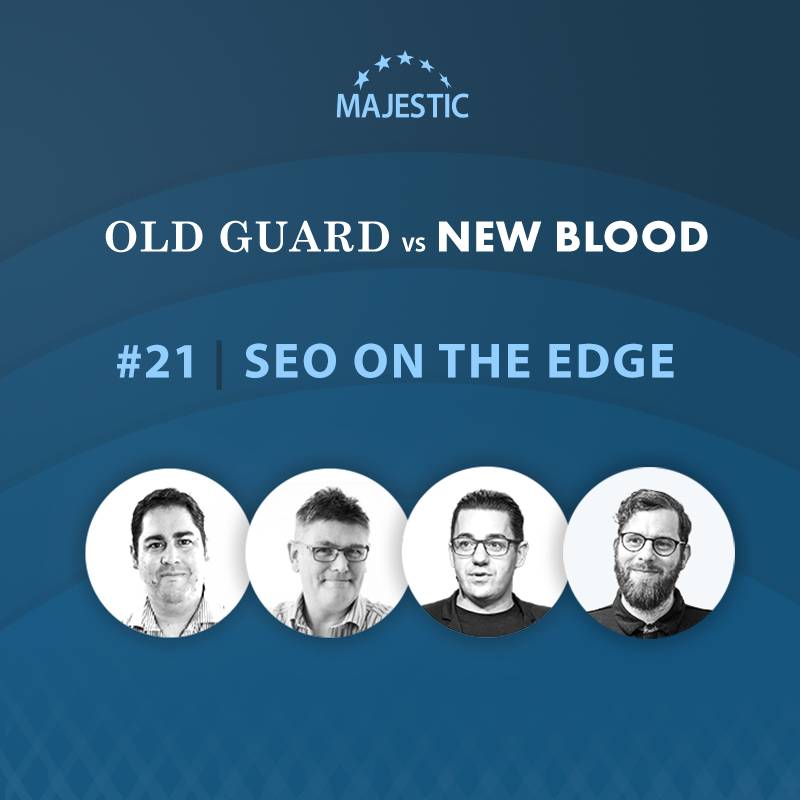-
Site Explorer
- Majestic
- Summary
- Ref Domains
- Backlinks
 New
New Lost
Lost- Context
- Anchor Text
- Pages
- Topics
- Link Graph
- Related Sites
- Advanced Tools
- Author ExplorerBeta
- Summary
- Similar Profiles
- Profile Backlinks
- Attributions
- Compare
-
Link Tools
- My Majestic
- Recent Activity
- Reports
- Campaigns
- Verified Domains
- OpenApps
- API Keys
- Keywords
- Keyword Generator
- Keyword Checker
- Search Explorer
- Link Tools
- Bulk Backlinks
- Neighbourhood Checker
- Submit URLs
- Experimental
- Index Merger
- Link Profile Fight
- Mutual Links
- Solo Links
- PDF Report
- Typo Domain
- Free SEO Tools
- Support
Volume/depth of content doesn't mean you will rank well
Chris Green
Chris Green says that 2023 is the year that you really need to invest in understanding what makes qualitatively good content.

Chris Green says “My additional insight is 2023 is the year that you really need to invest in understanding what makes qualitatively good content.”
Okay. And from your experience, what does make qualitatively good content?
“I think it's all about understanding the journey that the user is going on, and understanding not only what solves that problem, but then the next problem and the next one. It's kind of anticipating the onward or understanding this journey, this issue so well, that you know what the follow up question is, because seldom when anyone searches or looks for content, or an answer to a question, do they answer the question and then put down their phone or close that tab. Apart from a very specific set of examples, most questions are a journey. I'd say what makes really great content is content that owns that journey as best it can, ideally, through to completion. For that particular moment for that particular task, how do you, as a website, satisfy that? I think it's that focus on how do you own that all of the way.”
So it's certainly not about volume of content, then in 2023?
“No, no, no. And that may feel slightly at odds with some other kind of movements in scaling content, and how we can pump out as much as possible. Within the last year or so we've seen the effectiveness of mediocre to poor content start to diminish, and I think even within the last 12 months, we've started to see the rise and almost subsequent fall of lazily machine generated content, which in the whole kind of Google content paradigm is just a repeat of what's gone past. I think really investing in what works well has never been more important. Because we're watching it, we're seeing it every core update. The people that drop off are often publishers, who up until now have assumed that they had great surface level content that ticked a load of boxes that had the volume, but didn't resonate, or did not add any further value, and that's where it gets a bit woolly, but also where it's really, really crucial.”
When you talk about lazily generated machine content is all machine generated content lazy, in essence, ie, if you're generating content for important stages in your customer journey, can you use machine generated content to perhaps speed up the process a little bit? Or at this stage, even with ChatGPT, is machine generated content not really quite as good as human generated content.
“I think a subject expert who is good at writing or has a great editor will win, I'd say 10 out of 10 times, certainly in where we are currently, I'd be naive to think that will continue. I think machine generated content has its place, but it's all about the prompts, and then what you do when it's been generated out the other side. So I think it can work, I think the lazy part is relying on it. And so I've seen some workflows of scraping people also ask boxes to turn those questions into prompts generating content to then publishing it. You know, I think a lot of that has been done as proof of concept, but it has actually worked. I mean, that is the kind of antithesis of what we're discussing, and I think that is what Google just wants to not succeed. And we as users should probably not want it to succeed. I think the only people that do want it to work are those that are currently sort of profiting off it. I think that's the, that's the lazily generated part. I think you could have a subject expert that could write an incredible plan and machines, like GPT-3 could craft it into something that then could be well edited, and that could be an amazingly compelling piece of content. But that's still quite involved and it isn't the shortcut that I think people wanted it to be.“
You mentioned quantitative to begin with there. What are a few quantitative methods that you would recommend looking at?
“I would say investing in tracking and really becoming intimate with what users do with the data or with your content? What do they do after that point? What do they do when they're on the page? How long did they spend on there, which, if you're using Google Analytics as an analytics package, it's investing in additional methods of tracking, if you've moved to GA4, you may start to see some of the benefits of using GA4, because some of the out of the box event tracking is is stronger. But I think other software, anything from the UX space, that heat maps, that records is key, but then falling back a bit further. And that is actually slightly less easily measurable, but actually asking users what they think of it actually serving user groups, and getting people to undertake the journey that they would take with you watching them, watching them experience your content, not quite like eye tracking level, and some of the really sophisticated stuff, although that could be useful. But there's a lot we as SEOs could learn from UX teams in terms of how easy is this content to consume? How satisfying is it? What do I then what does it then enable me to do and that's tricky, because not everyone has the means or the time to necessarily do that. But I think if you've got a significant content budget, or this is the year we finally turn ourselves into the knowledge source, then I would say carve a reasonable chunk of your budget out to make sure it is actually good. To most marketers that haven't been involved in SEO that might feel almost so painfully stupid, it wouldn't even sound like something you'd need to say. But content strategies that are initiated from the SEO side of a business, quite often don't have the quality of content as a key output. It's usually volume or keyword targeting, or, topic clusters or internal linking. There'll be metrics that aren't actually related directly to user satisfaction. And that's quite a large omission that needs to be closed really?”
Are we at a stage where metrics like scroll depth and dwell time can have a measurable impact on SEO performance?
“I hope so. We're trusting that Google's ability to understand and reward the right behaviors how we imagine it, and that it's accurate. I think there's a lot of issues with what software we use to record that and what it then means. So what I'm getting at is I don't think the data we see in Google Analytics is linked directly in any way, but if people are making it back to search too quickly, then people not dwelling on a page might be a negative factor. If they're using Chrome, for example, you might assume that Google's ability to see or acknowledge that is somehow there. So yes, I hope so. I may sound like I'm flip flopping a little bit on how confident I am, and that's because that's entirely true. The fact is that we do more often than not, the better content is starting to float to the top more often than it used to be, you still find the odd exception.”
Are you actively using GA4 at the moment?
“I'm clinging to Universal Analytics, like a bit of a child, if I'm being honest. I am a strong advocate of dual tracking, I can see the benefits in terms of how the data is processed, how the event tracking works, and in some respects, I can see the direction they're going with the UI, and how they're weaning Universal Analytics users off certain metrics that are kind of unhelpful, but I am also a creature of habit that's quite busy. So I get Universal Analytics, I'm very, very aware of where it doesn't work very well, and that means it's quicker to work with. But if you're not tracking and you're not starting to get used to GA4 and the various metrics and dimensions, you're in for a surprise in 2023, that's for sure.”
Something else you say is invest in completing user journeys, rather than individual moments. Google certainly had a big thing about moments that matter, certainly in relation to paid ads a little bit more a few years ago. But completing user journeys certainly would focus on multiple steps, potentially, that you're looking for users to take. If you are a business that perhaps has a long sales cycle, or has those user journeys split up into parts at different times, how do you establish what those parts are, and how they actually impact on the bigger picture?
“So a lot of this is going to vary on your maturity of how well you already understand your customer and what data you already collect about them. So if you are a business that has a CRM that understands their customers that already has insights over their lifecycle, even if you don't fully sort of understand in depth, but if you know when they open an email, when they come back, when they fall into a retargeting audience, then you have a lot of the data to piece it together. So that's your fast track. If you don't, then firstly you work on your assumption, so coming back to your user journeys and personas, and are they really accurate? No-one's ever that linear, and people fall into different paths you, so you have to work out what the most likely touch points are based on what you know at a given moment. That's better than not having any clue, and means you can create a view, and create content that best fits that. Then you can start working on what are the exceptions, speak to customers, speak to customers that are happy, speak to customers that are unhappy, speak to the people that speak to customers to quite often, your sales teams customer support, but also look at the research around how do people Google your brand and your business? You will slowly build up a picture of where are these pain points and where the journey extends beyond it. I think I always come back to the example of when someone realizes they need a new TV, they might be searching for a dead pixel in the middle of a display. They're not searching for 'I need a new TV' or 'I want to buy a 42 inch TV' at that point. It's kind of understanding where did those problems originate from? But then once you've had a TV for a few years, you might want sound power, or you might want to connect internet enabled devices to it, and then it's just mapping the journeys into the solution or product you offer, and then what are the journeys when you leave it again, and this is lifecycle marketing. Or you could talk about the loyalty loop or traditional marketing funnel, there are already lots of models that kind of express that principle. But actually, the models are the models, they're over there your customers are in that direction, like what do they do? And firstly, ask them, especially the ones that are unhappy.”
That's about establishing the first few questions prior to actually getting to the stage where they're asking the questions that may result in a in a purchase. So obviously, there's not necessarily a direct content relationship between those questions, but it's establishing a common sequence that your target markets likely to go through. That kind of brings me up just to another related follow up question is that you also say that you should answer more than the first question answer the 2-3 following questions. How would you establish what the following questions are?
“First thing I usually do is find the content that already does it really well and see if they do it, are they already doing that? The second one is in undertaking that journey. So if it's a journey that you might be able to undertake yourself, go on that journey and go right, what would I do next? So you need to use your empathy, or roleplay, or however you want to frame that to put yourself in that position. But then it is also just asking those kinds of customers, so the subject experts in your business are the best ones to kind of understand what might happen. Whoever's questioning that subject expert needs to be as naive as they possibly can, and just ask seemingly stupid questions about the German in Germany and the product to remove any assumptions. There'll be so many questions that you can answer that you wouldn't think to because they feel so fundamental or so insignificant or inconsequential. But to a an uneducated user, they could be really critical. So I would run through that, and go through some of the established ways of mining this data, such as People Also Asked boxes, traditional keyword research, snooping on competition, etc. I would still look at those as core parts of it. But find out who's your product X product expert, and what can they tell you about the journey as well?”
You've shared what SEOs should be doing in 2023. So let's talk about what SEOs shouldn't be doing. So what's something that's seductive in terms of time, but ultimately counterproductive, something that SEOs shouldn't be doing in 2023?
“I think, if automation is your strategy or your play or your winning move, then you're going to have some troubles this year. Specifically, I mean any method of "how are we going to solve our problems - let's automate things", and that's not because automation is bad, but because automation is an enabler for achieving something, but it isn't the starting point. If your issue is scaling this new content strategy, or creating content that resonates at the right times, then automation is an enabler or a method to help you achieve that, but it isn't your strategy. So don't over rely on that, you're still the marketer and the expert, so it has to come from you. In my experience, 6 times out of 10, if you think automation is going to save you time, it doesn't. If anything, it creates a whole new set of problems, because you just weren't aware of what they were. It's a tactic, isn't it? Yes, 100%. But to many marketers it's the panacea and all it should be about. If you're not investing heavily in automating and speeding up these workflows, then you're failing somehow, as a marketer. It can help but very, very few people need it. With automation, what's advertised looks very cool, it feels very cool, and it is exciting. Because I'm a nerd I do find automating stuff really cool sounding, but it's almost never the solution.”
Chris Green is a senior consultant at Torque, and you can find them over torquepartnership.com.
Also with Chris Green
Choose Your Own Learning Style
 Video
Video
If you like to get up-close with your favourite SEO experts, these one-to-one interviews might just be for you.
Watch all of our episodes, FREE, on our dedicated SEO in 2023: Additional Insights playlist.
 Podcast
Podcast
Maybe you are more of a listener than a watcher, or prefer to learn while you commute.
SEO in 2023: Additional Insights is available now via all the usual podcast platforms
 SEO in 2023
SEO in 2023
Catch up on SEO tips from 101 SEO experts in the original SEO in 2023 series
Available as a video series, podcast, and a book.
Could we improve this page for you? Please tell us







